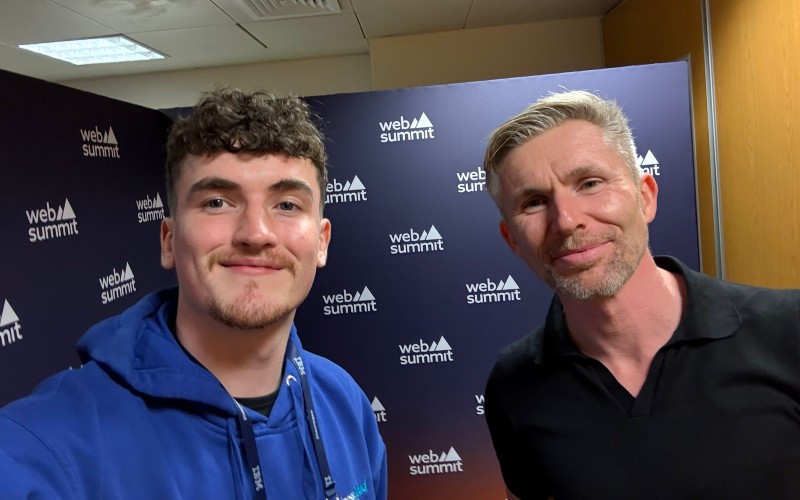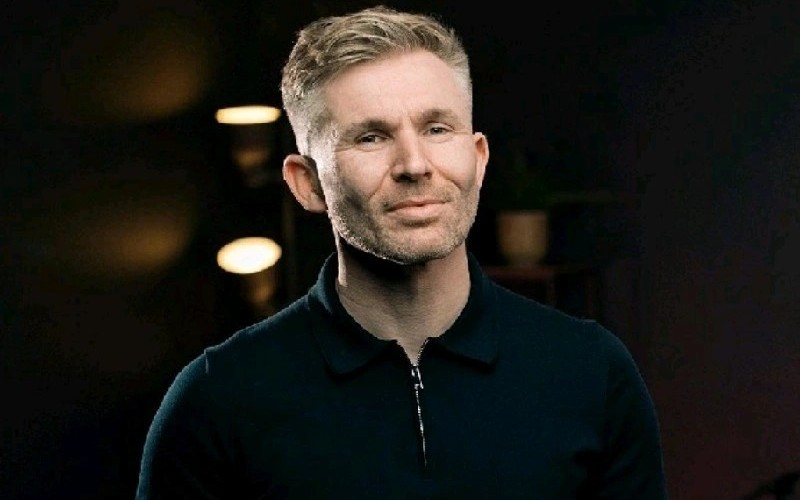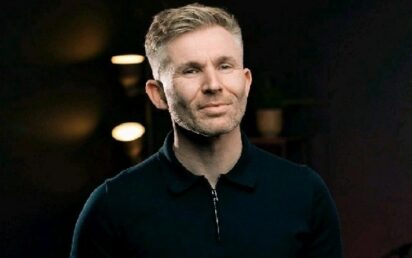David Savage has spent almost two decades with global talent solutions firm Harvey Nash, but he’s perhaps become best known as the host of the Tech Talks podcast.
The podcast is ranked among the top 2 per cent globally and probes the minds of technology leaders.
Over the last decade, Savage has interviewed thousands of guests, from startup founders to executives at global corporations, whilst moderating and speaking at events including Web Summit, IFA Berlin, Collision, and Money20/20.
@businesscloud.co.uk Web Summit Day One! Join Chris Maguire and Patrick Killeen as the first full day of @websummit ♬ original sound – BusinessCloud
However, his route into broadcasting can’t exactly be described as traditional.
A passion project
“I started this as a passion project on the side of my desk when I was a recruiter, and it just grew into my job,” he tells BusinessCloud at Web Summit in Lisbon.
“And then six years ago, we wrote the job description, and actually codified what this is.
“My job is kind of part comms, part sales, part marketing.
“For a business like ours, if you’ve got a podcast like Tech Talks that has genuine reach and credibility, that opens doors for them that nothing else would.”
Savage produces three episodes a week, speaks at around 10 conferences a year and estimates he interviews around 200 people annually.
He adds: “I don’t lead with a sales piece, but if 5 per cent of them turn around and go, ‘You know what, we’ve got some talent issues. Could we have a chat with you?’ then that in itself makes sense in the business.
“It wins new business opportunities, but it also is soft positioning, soft branding and soft touch selling.”
Slow burn
When Tech Talks launched in 2015, it didn’t immediately find its audience.
“It is a massively slow burn,” explains Savage.
“I don’t think it really had any listeners for about six months when I first started.
“The growth of the audience has almost exclusively been through people being on the show and sharing that they are on the show
“You do that for 900 episodes, bigger people come on and then, over time, it develops consistency and credibility.”
That credibility, he says, has led to conference invites and gaining industry trust.
He continues: “This is my eighth Web Summit. I’ve done three Web Summit Rios, I’ve done two Collisions, I’ve done IFA, two CES, Money20/20, TechBBQ, Tech Summit Dublin, to name a few.
“You get put on stages with bigger names and it all self-perpetuates.
“It’s positive reinforcement – messaging that you’re credible, consistent, there, that you know people. It just elevates it over time.”

Patrick Killeen and David Savage at Web Summit Lisbon
Sh*t beginnings
Savage believes persistence matters far more than polish when launching something new – a lesson learned through conversations with others in the podcasting space.
He points to David M. Brear, CEO of 11:FS, the consultancy behind FinTech Insider – once the UK’s number one business podcast.
Savage first interviewed Brear years ago, and the two now sit together on the advisory board of Started PR, founded by Kimberley Waldron.
Over dinner recently, Brear admitted he often wondered whether anyone really listened closely to what he said on his own show, to which Savage reminded him of their early conversation.
He explains: “He told me that the first 10 of anything you do are going to be sh*t.
“If you don’t start something, you’ll never get past that.
“I still give that piece of advice to people today.”
Imposter syndrome
Savage admits that confidence doesn’t always come easily, even after nearly a decade in front of microphones and on global stages.
He laughs about how often imposter syndrome still creeps in.
In interviews, he still finds himself questioning whether his answers ‘sound legit’ when he’s not been trained in the subject he’s talking about.
“I’ve never built anything in tech,” he says. “Yet there I was, standing up and telling the industry what it should be doing.”
However, that’s where he believes the strength lies.
He believes storytelling can bridge the gap between complex technology and the people it affects.
Whilst AI is moving at lightning speed, he says humans remain the same social creatures who once gathered around campfires to share stories.
He explains: “If you sit down, you story-tell and you get someone to connect with an idea, that’s different.
“That skill set and that need is really important right now.”
Stay relevant
Savage, not being in an entrepreneurial role, describes his career as something that’s constantly evolving.
He sees it as an agreement renewed year-by-year.
“I’ve always viewed your career as a kind of (thing) you basically sign on for a year at a time,” he explains.
“If the company wants you and you want the company, it’s kind of like, ‘okay, this works for them, works for you, works for me, so let’s keep going’.
“Any role has a finite length of time and I’ve been in the job for five or six years now.
At some point, the company will probably look at it and go, ‘is this what we want?’
Travel Counsellors CEO: ‘We need to use AI to our advantage’
So you have to question if what you’re doing is adding value – is it fulfilling, what happens next?”
That mindset has led him to explore new topics that merge technology and lived experience.
He reveals that he has a genetic autoimmune liver disease, primary sclerosing cholangitis (PSc) – something that has sparked his growing interest in healthcare and patient stories.
“I’m thinking about what I can do to pull together stories from across tech and health, but also patient stories,” he says.
“I’m also increasingly interested in that narrative piece, that investigative piece – not pure journalism, but weaving together different stories.
“You’re constantly going, ‘what can I do to improve this stuff? ‘What can I do to make myself relevant and to have a place where I’m adding value?’”
Hall of Fame
Asked for his favourite guests, Savage doesn’t hesitate. “I always talk about what3words,” he says.
“When I first interviewed what3words, I hadn’t heard of them.
“It was quite early on in their story, and I interviewed Clare Jones, who at the time was their CCO.
“It was one of those moments where I thought the product was so good, but one of those where the idea is really simple and it can be applied in so many different ways.
“I also interviewed (former leader of the Liberal Democrats) Vince Cable.
“I sat down with him at his office and we talked and talked and talked.
“I just chatted to this guy who I’ve grown up watching. To sit and chat to someone like that who’s had all of that lived experience was brilliant.
“I just thought: ‘I don’t know how I’m in this situation, just having a one-on-one chat with Vince Cable in an office, but here I am!’”


